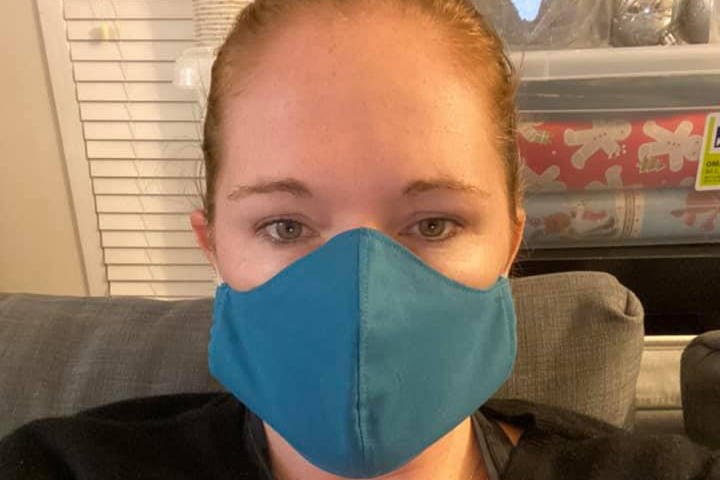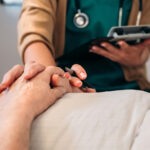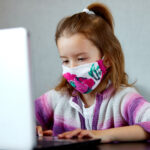Last fall, Haleigh Callison made headlines across the province after sharing her terrible experience getting COVID. But the ordeal is not yet over for the former Canadian Women’s Hockey League player from Smithers.
Callison told the story of her ongoing recovery during Skeena Strong’s recent “Fighting COVID In The Skeena’ event, a virtual discussion that also featured local COVID survivors Harry Good and Marilyn Stewart, as well as experts on the vaccine. (You can watch the whole thing here.)
Here’s what Callison had to say about her personal struggle with coronavirus and her advice for people across the Skeena as we continue to battle this pandemic.
On how she got COVID in the first place
“So I actually still don’t know how I contracted it, they weren’t able to trace it. I got a text on November 10 that I had tested positive and I can tell you that is an extremely scary experience to get a text like that. You know, you’re looking at this unknown, knowing that it affects people so differently. And also, what goes through your head at that time is, ‘who have I seen?’”
“I do have a very small bubble. At the time, it was my two brothers and their families. And it’s quite terrifying to have to make those phone calls and send those texts to say, ‘Hey, I just got these results. I don’t know how or where I got it or when I got it.’ And at that point, you know, I informed work and a couple friends. I wasn’t feeling great.”
On what it felt like as symptoms got worse
“The fatigue was unbelievably unbearable. I was exhausted trying to brush my teeth. I was exhausted warming up soup from someone that brought it to me. I was nauseous. I had diarrhea. I had body aches and pains. I was shaking, sleeping with ice packs for a couple nights.”
On the mental and emotional struggle
“And it sounds strange, but like the bad thoughts and weird thoughts were quite overwhelming. I now believe that was partially due to the stress of the unknown of how I was going to experience COVID throughout that time. And also kind of the fear again of how it might affect the loved ones that I had seen. One other thing that was probably the hardest part was I just remember lying on the floor of the bath, like in a shower and like waiting to throw up again and thinking about like, if my parents get this. I don’t think they’d make it.”
“And then I worried about other loved ones and people I know that might be immunocompromised. I’m a fairly healthy person. I play pro hockey, I’m active. You just don’t know how it’s gonna affect you. And it’s, it’s terrifying.”
On the long slow recovery from COVID
“So I’m about three months out and actually had a doctor’s appointment yesterday. And I’m being put through to a post-COVID study. I don’t know the details around it yet. But I figured if I could put my hand up and they can learn something from me to maybe help somebody else understand why they’re experiencing what they’re experiencing, then I’m then I’m in.”
“But right now, it’s still the fatigue like two to three times a week. I just am exhausted, like I have to sleep. There’s no option, I have to lie down, and I have to sleep. Sometimes it’s an hour, sometimes a couple hours.”
On how this disease has affected her ability to work
“I’m a lumber trader, and I’ve been working from home since March 16. And my company’s super supportive. You know, saying ‘take care of yourself first and foremost.’ And I’m very, very lucky. Not everyone has that luxury. And so the fatigue is crazy. And then also the fogginess, and sometimes dizziness. With the fogginess, I just have to be really careful to triple-check my work or if I’m doing something just be extra cautious.
“And I mean, for the first couple months it was really stressful and overwhelming to think like ‘am I going to experience this forever?’ And now, it’s what I feel, so I deal with it when I have to deal with it. And again, like I said, I’m lucky I’m at home and I can turn around and hop into bed for a half hour if I need.”
On advice she has for other people in the Skeena
“My advice is more for people who either didn’t have it very bad or who haven’t had it. I understand everyone’s tired. Everyone’s tired. Like, if you guys think you’re tired, the doctors, and the nurses, they’re really tired. Dr. Bonnie Henry would love to not have to do these reports over and over again.”
“The hardest thing for me was seeing people post things like, ‘Oh, this is a hoax, or this is just a political thing’, or this is, you know, whatever their perspective is of the strain on mental health caused by this pandemic. And I totally agree, it has been really hard for everyone in the last year, I don’t question that.”
“But I can promise you, if you’re going through it, or someone you love is going through it, the mental health part is 10 times harder. And I guess I would just ask, my advice would be before you post something, think about it for one second. If it was your mother or your grandparents in the hospital, in ICU, or it was your partner on the floor throwing up, would you still write what you’re going to write on social media?”




